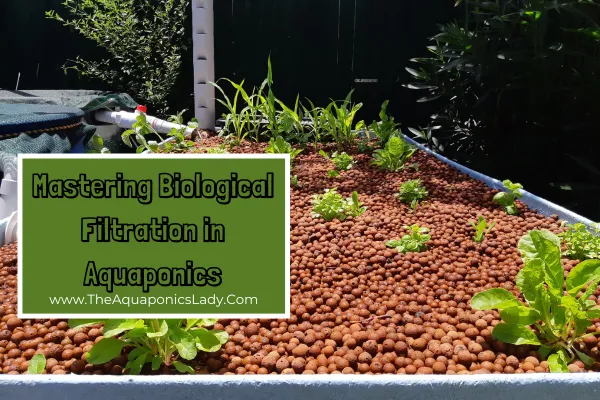
Mastering Biological Filtration in Aquaponics Systems: Aquaponics Biofilters Explained
Best Practices in Aquaponics Systems for Maintaining Water Quality
Biological filtration, often referred to as the biofilter, is the cornerstone of any successful aquaponics system.
It's not just crucial for aquaponics but also essential in aquariums and aquaculture systems.
The biofilter plays a pivotal role in converting fish waste into valuable fertiliser for plants, making it an indispensable component of your aquaponics setup.
This is what makes aquaponics the most sustainable form of gardening we have; everything replicates nature in a manufactured ecosystem.
What is Biological Filtration?
Biological filtration is the process where nitrifying bacteria convert harmful ammonia and nitrite from liquid fish waste into less harmful nitrate, which serves as a nutrient (fertiliser) for plants.
This nitrification process is vital for maintaining a healthy aquaponics ecosystem.
The Role of Nitrifying Bacteria
As discussed in previous posts about the nitrification cycle, two types of nitrifying bacteria are key players in this process:
Nitrosomonas: These bacteria convert toxic ammonia from fish waste into nitrite, an intermediate compound in the nitrogen cycle.
Nitrobacter: These bacteria transform nitrite into nitrate, a safer compound that serves as a nutrient for plants.
These beneficial bacteria need a dedicated space (home) to thrive, which is where the biofilter comes in.
It provides a large surface area for the bacteria to colonise, ensuring that they can effectively process the waste produced by your fish.
Importance of a Healthy Aquaponics Biofilter
A robust and well-maintained biofilter is essential for the health of your fish and plants.
If the colony of nitrifying bacteria is too small, it won't be able to handle the ammonia load, leading to toxic water conditions.
Hence the saying 'you can never have too much biological filtration, but you can have not enough'.
This means that a large, healthy colony ensures that ammonia and nitrite are continuously converted into nitrate, keeping the water safe for fish.
Types of Biological Filters
1. Grow beds:
In-home aquaponics, the most common biofilter is the grow bed. Filled with expanded clay or gravel, these grow beds provide ample surface area for bacteria to colonise and support plant growth.
Check out this video to understand more about the importance of surface area for biological filtration in aquaponics:
The benefit of a grow bed filter is that it doubles as a veggie growing area, whereas other forms of biofilters don't.
2. Dedicated Biofilters:
A separate biofilter is necessary for those who prefer not to use grow beds.

These often consist of bioballs or other plastic objects with high surface areas. These materials won't break down over time and provide an ideal environment for bacteria.
Ensuring Adequate Filtration
Every aquaponics system must have adequate biological filtration.
You can never have too much filtration, as excess bacteria will simply go dormant until needed.
However, insufficient filtration can lead to water quality issues and sick fish.
Regular monitoring and maintenance of your biofilter will ensure a thriving aquaponics system.
The Take Away - Biofilters for Aquaponics are a Must-Have
Biological filtration is a fundamental aspect of a successful aquaponics system; this is what makes it an effective ecosystem.
By understanding and maintaining your biofilter, you can ensure the health and productivity of your fish and plants.
Remember, a healthy biofilter means healthy fish and, ultimately, a flourishing aquaponics ecosystem. It will help maintain water quality in aquaponics systems to keep everything balanced.
Learn More About Aquaponics
Check out the COURSES page to learn how you can get started with aquaponics now. Click HERE.
Want to get your Eyes and Hands on the FREE Online Aquaponics Essentials Course?
This is a great free resource to really understand how aquaponics is a sustainable ecosystem that will grow your organic food is a productive way.
You learn how all the 'parts' make up the 'whole', and helps to give you the foundations of understanding aquaponics.
Sign up HERE
Want to help out and Feed my Fish?? (They don't drink coffee)

Candy Alexander is a dedicated aquaponics enthusiast with a wealth of formal training in aquaculture. Over the past 15 years, Candy has been deeply immersed in both commercial and backyard aquaponics, honing her skills and expertise in this sustainable farming method.
Candy's passion lies in making aquaponics accessible to everyone. With a mission to simplify aquaponics, she believes that anyone can embark on this sustainable journey.
She encourages those new to aquaponics to "kick the tires" without a significant financial investment. Her guidance focuses on helping people start their aquaponics journey with small-scale systems, ensuring a low barrier to entry for newcomers.
Candy shares practical tips, step-by-step guides, and personal stories to inspire and guide readers on their aquaponics adventure. Whether you're a seasoned farmer or a curious beginner, Candy Alexander is your go-to source for simplifying aquaponics and fostering a sustainable gardening experience.